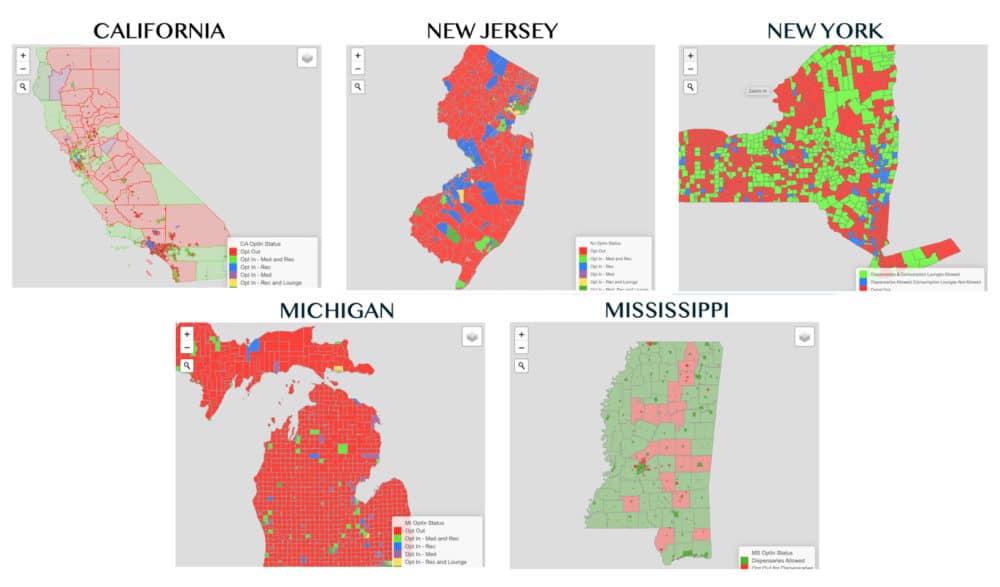Editor’s note: This editorial was contributed by Frederika McClary Easley, Director of Strategic Initiatives at The People’s Ecosystem, with market research assistance provided by Alec Estevez.
When states regulate adult-use cannabis consumption, the feeling of many is that the work is over and the floodgates for cannabis will be opened. There are ideas and dreams of being able to purchase plant medicine with the same ease that one can purchase a cup of coffee or tea. The reality is that in many places, that dream has not and will not be realized, and purchasing ease will remain aspirational. In many states, deserts exist that force consumers to drive in some instances two to three hours from home to acquire cannabis. Why is this the case, you wonder? Well, you have opt-outs to thank for this.

What are opt-outs?
Opt-outs are a municipality/county’s ability to choose not to allow adult-use (recreational) cannabis businesses to operate within their jurisdiction. Opting out requires an official action declaring that cannabis businesses will not be allowed to operate. This action must be taken within the timeframe set by regulatory bodies. Failure to do so means automatic inclusion. Now it’s important to note that these decisions are often made in direct opposition to the sentiments and voting trends of constituents and thankfully, opting out does not prevent consumption.
Reasons for opting out oftentimes center around fear of the unknown. How will these businesses, especially retail and consumption lounges (if included), impact the community? There may also be a want for additional time to flesh out zoning and other governance issues. Whatever the reasons, the option is taken often and data shows that opt-outs are skewed to be the preference of rural areas, those outside of major cities and urban environments.
Take California for example, where adult-use cannabis consumption has been regulated since late 2016. Six years later and after many lessons learned, as of May 2022, only 38% of counties/cities in the state allow retailers. And this is with the flexibility of being able to opt-in at leisure, without penalty. And almost 20 years post the first state-regulated cannabis adult-use consumption we are seeing similar trends. In February of 2021 New Jersey passed legislation to regulate adult-use and a super majority, over 70% of municipalities opted out of allowing businesses to operate.
What does this mean for communities and entrepreneurs?
An additional “canna tax” was one of the first things mentioned by Keith Mosley when asked about opt-outs. Keith is an entrepreneur working to operate in the cultivation space within Michigan and New Jersey. “Opt-outs drastically impact real estate. We’re dealing with supply and demand here. When you combine them with zoning restrictions available spaces are limited and property owners know this. This allows them to charge premium prices that they know you pretty much have to pay because what else are you going to do. They know they have the leverage.”
The reality is that in some areas, property costs are already through the roof. Think of California and New York. Adding cannabis, a substance that is still federally illegal, into the picture increases the complexity. When questioned about the claim of premium prices being attached to spaces, Keith said, “This is easy. When you go to a space and see its condition versus what’s being asked, sometimes it doesn’t make sense. When you do your research and look at comps in the area and the difference between those that are in green zones compared to those that are not, you’ll see.”
“And the additional challenge will be securing funding,” he said. “If you are able to get a bank to bite, they’ll have an assessment done, and often the number from that will be drastically different from the asking price and banks typically lend up to 70% of the assessed value. So now you have to figure out where to get the rest of the money from.”
For Michael Diaz-Rivera, owner of Better Days Delivery, being away from family is a big part of his story. Originally from Colorado Springs, where he received a felony cannabis charge, Michael moved to Denver initially to reinvent himself but wound up staying in order to engage in an industry and with the plant he was criminalized for. Unfortunately, Colorado Springs, an area known to be religious and military-centered, opted out of the adult-use industry and Denver is the only city that not only opted in but created a pathway for social equity with exclusivity. Michael wants the extent of opting out to be fully considered: “What does it mean comprehensively, who really winds up impacted? I know people who need this medicine back home and I’m unable to get it to them… I can’t deliver in that area. And maybe they don’t have a vehicle or the means to travel. They are technically able to consume but access is denied.”
Cornell Fairley, Founder and CEO of Lazy Pistolz, is a resident of Rochester Hills, Michigan, and gives an extreme account of harm caused by medical and adult-use opt-outs. Being both a patient and aspiring entrepreneur he is dealing with the impact on multiple fronts. As a patient, “I’m being double taxed. I have to drive close to an hour away from my home to reach a dispensary and my preferred medical dispensary location has been without my medicine for nearly six months. This has led me to purchase from Adult-Use only retail options that do not honor the medical discounts I am qualified for as a card-carrying patient”. As you can imagine, as an industry applicant, he will have to go outside of his area maybe just to do business, or relocate.
Solutions
It’s not enough to talk about the problem. We must put forth solutions. The following are possibilities that interviewees and I would love to be considered.
- Set opt-out periods after the regulations are fully written, or at least a substantial amount of them.
- States should incentivize early opt-ins with tax revenue and/or other needed support.
- Give citizens the opportunity to vote.
- Ensure that municipal meetings are held at times that make participation for the masses more feasible.
- Institute a system where decision-makers have to report back to constituents on progress made pertaining to the reasons given for opting out.
Opt-outs, after nearly a decade of adult-use cannabis regulations around the country, are as much of an issue now as they were then. And contrary to what many believed in terms of opt-outs being temporary and based on uncertainties about the industry, many municipalities have yet to reverse their initial decisions and accept the adult-use industry. One must ask, why not allow constituents to be educated without bias and with data on where things are, and for opportunities to be created for them to weigh in on what comes next? If not, we will continue to have a thriving legacy industry and will ultimately be doing a disservice to people in need.
Get daily cannabis business news updates. Subscribe
End
